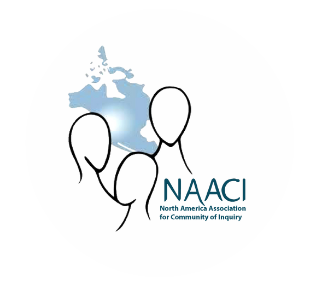A Short Update
The history below was written by the outgoing president and founder of NAACI in 2008. Our executive committee is composed of myself, Susan Gardner of Canada and Maria Teresa De La Garza of Mexico. We continue to evolve the nature of our organization and are excited by some new projects for the future.
–Wendy C. Turgeon,
St. Joseph’s College
New York, USA
6/24/16
A Short History of the North American Association for Community of Inquiry
NAACI grew out of a “call” that originated in the Notes of Interest section ofAnalytic Teaching: The Community of Inquiry Journal. The first meeting of NAACI was held in Austin, Texas, in the summer of 1994. The goal of the NAACI is primarily to sponsor semi-annual meetings for educators There is a beautiful anarchical thread that runs through the fabric of Philosophy for Children’s practice – a basic mistrust of organizations and requirements and impositions. As Philosophy for Children grows, it seems we undergo the same expansion and layering of organization that other groups suffer. The North American Association takes seriously that anarchical thread and thus, presents itself with diffidence. It invites for membership all those who think there are problems with Philosophy for Children, and who would be willing to attempt to solve these problems. NAACI has continued in the anarchical spirit, as stated in the organizational call (Reed, 1992, p. 2).
Although the organization has held seven semi-annual meetings, it has still to publish a newsletter, is just beginning this website development project and, at the present time, has only a barely- organized governing board. This loosely-connected group of scholars has nonetheless engaged in an important conversation, some threads of which I will present here. While these threads do not represent all of the topics presented at the semi-annual meeting, they do represent some of the important themes. One of the threads that will be explored relates to the community of inquiry as an important tool for understanding, and improving thinking, teaching, and learning. Our organizational orientation follows Dewey’s vision of democracy as a guiding ideal rather than an accomplished state. We see a community of inquiry as a possibility that can never quite be realized, though it provides a vision of what we hope to accomplish. Our vision of a community of inquiry contains a number of key elements: meaning-making, student-centered inquiry, reflection on practice, respect for persons and ideas, philosophical or deep questioning, falliblism, and thinking for one’s self within a safe environment (notes from Vancouver meeting, 2000).
NAACI conferences covered four broad themes over the seven semiannual conferences: (1) Community of inquiry in schools and the university
(2) Globalization, community of inquiry and philosophy
(3) Community of inquiry and democracy
(4) Community of inquiry and critical thinking.
Here the focus will be primarily on community of inquiry and critical thinking. At the culmination of the 2006 meeting in Quebec City, Canada, I outlined a set of broad goals for NAACI. These goals included an outreach to like-minded groups, programs, and individuals and the establishment of platforms for presenting research outside of Philosophy for Children circles (see PowerPoint slides for these presentations at http://www.fp.ulaval.ca/philoenfant/colloque2006/index.htm
Richard E. Morehouse
Ex-President, NAAC
July 2008
